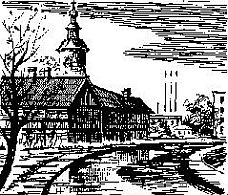 |
Kotlas - Waterville Area Sister City Connection P.O. Box 1747 Waterville, ME 04903-1747 Write to Us |
 |
 |
Kotlas - Waterville Area Sister City Connection P.O. Box 1747 Waterville, ME 04903-1747 Write to Us |
 |
|
Home > About Kotlas > History > Gulag > Kazimierz Zybert Archives of the NKVD in Archangel — Exactness, Orderby Kazimierz Zybert At the Union of Siberyaks [Siberian Deportees], I was told that I needed only a certificate of repatriation in order to get certain small pension privileges for having been sent to the USSR during the war. That was precisely the one document from those years I did indeed have. But as a souvenir I wanted another one. I wanted to have serious proof that I was in fact there, that in an Archangel camp in the Kotlas region, at the age of 14, I had to serve as a lumberjack in the Limenda Forestry Enterprise, in the settlement called Yagodnoye. Maybe it was a whim, but, by God, everyone has something from those years — either an Auschwitz number on his arm; some kind of military medal from the partisans; for Warsaw, for Monte Casino, some kind of smuggled messages; arm-bands from the Uprising; arm-bands from the ghetto; some kind of diploma — but I had nothing, only a certificate that I had returned. No, I was not any kind of combatant. I knew that my "wartime losses" were minuscule compared with others'. There, near Kotlas, fate treated me relatively leniently. After all, this wasn't the classic Soviet gulag. It was a normal settlement without barbed wire, without guard towers, without gangs of brutal jailers, but instead a small "settlement" — three little barracks forming a cross, around which were hundreds of deportees and their families. There was one commandant with a revolver in his belt, that's all. How about escaping? Please, I'd like to see you go out into the Archangel taiga, but I don't advise it. That's all true, but please believe me that it wasn't pleasant there. That was the most tragic period of my life, of all my life, not only of my childhood. I don't want to trade stories, but I had to enlighten a certain distinguished ambassador when he started to make stupid remarks about how I would willingly trade my six years of ill-treatment for a few months of his internat [which can be either a student dormitory or a reform school]. And so I commenced my search for traces of my stay and my work in the forests of the Archangel Region. For nearly two years my correspondence with our consuls in Russia and in the Ukraine dragged out. I kept getting the polite information that this matter must take a long time. I thought to myself: Kotlas is a district center, An answer came, or rather a letter from Kotlas, from a certain Irina Andreyevna Dubrovina. Irina wrote that first of all, the newspaper simply printed my Everybody doubted the success of this last mission. Especially I, who knew from personal observation the bureaucratic manner of Soviet authorities, didn't believe that in distant Archangel there would be found a trace of paperwork about a certain young kid who was lost in a little settlement in the backwoods of the Kotlas forests. It was unbelievable, but then it came! Irina from Kotlas sent me another letter, and with it was the most authoritative document, which for me, and probably for many others, was a true revelation. There was a lot more than I had expected, than I had dared to dream of. It was an official letter, on an official form, stamped with the government emblem and with two round seals and two signatures. At the top the letterhead: "MSV USSR Ministry of Internal Affairs of the Executive Committee of the Archangel District Soviet of Peoples' Delegates", the address, street, even telephone number, if one wanted to call, "teletype 125", the date, the case number. And the thing itself: "Attestation of the Archives". There [it was written] that in accordance with documents in the files, And now several words about Irina Dubrovina: She comes from Stalingrad [now Volgograd, a city 570 mi. S of Moscow]. She was 10 years old when they arrested her father, a teacher, and sent him somewhere beyond Vorkuta [which is near the Arctic Circle]. In order to get into the university in Leningrad, she had to hide that she was the daughter of an "enemy of the people". When she graduated and had to accept a job offer, she was already afraid to hide it, so she was sent, as she writes, "into the far reaches", to Kotlas. She arrived there in the year of Stalin's death. In cold Kotlas (I read that right now it's -40 °C. I believe it, as I myself lived through -57 °C), she took root, and had her family, with grandchildren. [Now] she's retired and puts all her energy into the Kotlas Sovest, devoting herself totally to the ideas of that organization — help to the living, memory to those who died. How beautifully, with such fervor, she writes about her sacred work! Here is some information about "Conscience" which is contained in Irina's letters: Sovest was organized in Kotlas in 1989, right after it was founded in Archangel, the provincial capital. It is, as we would define it, "a self-governing, independent organization", though in concept it has much in common with the Russia-wide organization "Memorial", which is well known to us. It brings together the victims of Stalinist terror and their families, hence, one can assume, almost all the citizens of the Archangel taiga, and certainly of Kotlas. For it is necessary to know that Kotlas was a special place on the map of Gulags. Here at one point ended the rail line to the east and north. From here on foot, in sleds and on barges prisoners were herded into the endless expanses of the Archangel and Komi taiga, which were literally sprinkled with camps and involuntary work camps. Here was the transit station for prisoners who were headed in the direction of the White Sea, the Barents Sea, and Vorkuta. Here prisoners after their release settled and brought their families or formed new ones. I must say that Kotlas is almost a Polish village; it's populated to a large degree by Polish exiles even from the 1920's and 1930's. Either whole Polish villages from the Ukraine were displaced here, or [people were sent here] simply within the framework of the policy of raskulachivaniye [dispossession of the kulaks]. During his exile to Yagodnoye, my father's glasses were broken and the commandant allowed him to go to Kotlas to get new ones. He said that he heard Polish on the street there, and the Polish optician had been exiled there in 1928. I know that among the Polish Sybiraks there are many "Archangelites" and "Kotlassians". I consider Kotlas a very important point for us on the map of Europe. From Polityka, a Warsaw weekly, Jan. 18, 1992
<— Previous • Top • Intro • Next —> |